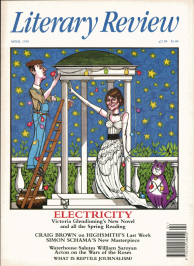Frank McLynn
Eastern Sage
Rabindranath Tagore: The Myriad-Minded Man
By Andrew Robinson and Krishna Dutta
Bloomsbury 493pp £25
Rabindranath Tagore (1861–1941) has been the subject of two different sets of misconceptions. After early literary success in the West his reputation dwindled almost to nothing. He had earlier won plaudits from poets as various as Eliot, Pound, Bridges, Owen and Yeats, but most of these quondam champions deserted him, until in the end only Yeats remained. The perception has remained that he was a mere spinner of beautiful trifles, a man who was awarded a Nobel prize purely on the Buggins’s-turn principle, or because the Nobel committee in 1912 could not bring itself to honour Thomas Hardy. Philip Larkin’s response is typical. In 1956 he wrote: ‘An Indian has written to ask what I think of Rabindrum [sic] Tagore: feel like sending him a telegram: FUCK ALL. LARKIN.’ As a thinker, Tagore bred little better under Western eyes. In 1913 Bertrand Russell wrote to Ottoline Morell: ‘Here I am back from Tagore’s lecture, after walking most of the way home. It was unmitigated rubbish – cut-and-dried conventional stuff about the river becoming one with the Ocean and man becoming one with Brahma.’
In his native India, on the other hand, Tagore was suspected of being a mere Uncle Tom for the Raj. The Spanish-born Harvard philosopher Santayana was once extremely disconcerted to find himself described in a newspaper as ‘the Eastern sage Santayana’. Tagore’s problem was the exact opposite. A genuine Eastern

Sign Up to our newsletter
Receive free articles, highlights from the archive, news, details of prizes, and much more.@Lit_Review
Follow Literary Review on Twitter
Twitter Feed
Juggling balls, dead birds, lottery tickets, hypochondriac journalists. All the makings of an excellent collection. Loved Camille Bordas’s One Sun Only in the latest @Lit_Review
Natalie Perman - Normal People
Natalie Perman: Normal People - One Sun Only by Camille Bordas
literaryreview.co.uk
Despite adopting a pseudonym, George Sand lived much of her life in public view.
Lucasta Miller asks whether Sand’s fame has obscured her work.
Lucasta Miller - Life, Work & Adoration
Lucasta Miller: Life, Work & Adoration - Becoming George: The Invention of George Sand by Fiona Sampson
literaryreview.co.uk
Thoroughly enjoyed reviewing Carol Chillington Rutter’s new biography of Henry Wotton for the latest issue of @Lit_Review
https://literaryreview.co.uk/rise-of-the-machinations